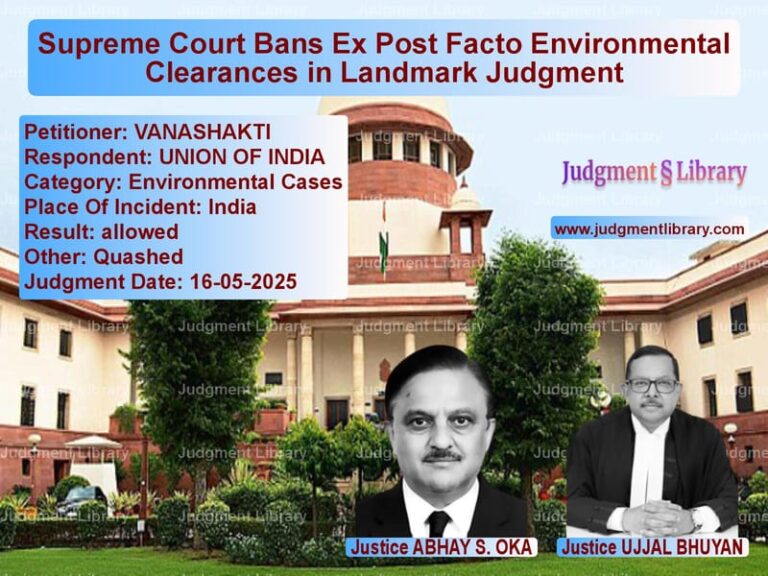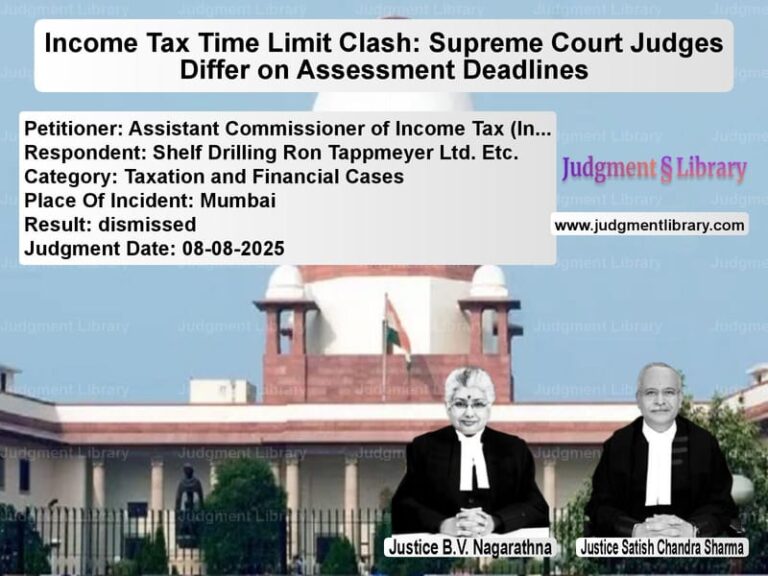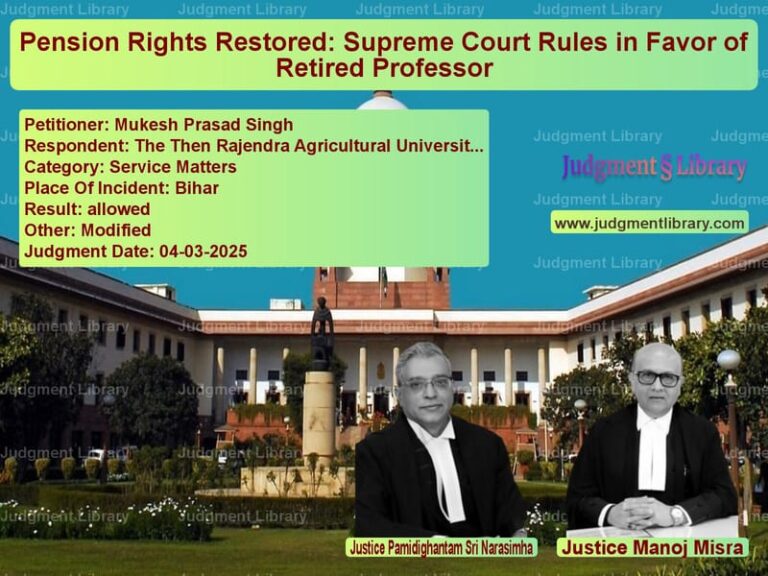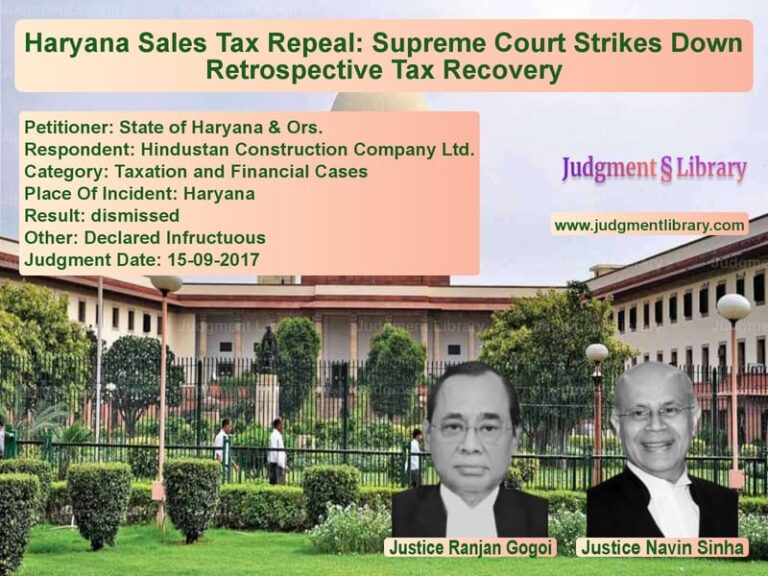Supreme Court Rules in Favor of Appellant in Land Auction Dispute
The Supreme Court of India delivered a significant judgment in the case of Suresh Kumar Wadhwa vs. State of M.P. & Ors., addressing the legality of a land auction conducted by the State of Madhya Pradesh and the subsequent forfeiture of the appellant’s security deposit. The case revolved around the interpretation of contract terms, adherence to public auction conditions, and the scope of government authority in forfeiting security amounts.
The case originated from a public auction of government land in Mahavir Nagar, Arera Colony, Bhopal, conducted on 11th January 1996. The appellant, Mr. Suresh Kumar Wadhwa, participated in the auction and emerged as the highest bidder for a specific plot. He deposited the required security amount and partial payment as per the auction terms. However, the State introduced additional ‘special terms and conditions’ after the auction, leading to a dispute over the forfeiture of the appellant’s deposit.
Background of the Case
The appellant filed a suit against the State of Madhya Pradesh after his security deposit of Rs. 3 lakhs was forfeited. The core issues before the court were:
- Whether the appellant had committed any breach of the terms and conditions of the public auction.
- Whether the State was justified in forfeiting the security deposit.
- Whether the State had the authority to impose additional conditions post-auction.
Arguments by the Petitioner
The appellant contended that:
- The special terms and conditions were not part of the original auction notice and were introduced arbitrarily after his bid was accepted.
- The terms of the auction did not specify any forfeiture clause, making the State’s action unlawful.
- He had complied with all original conditions, including depositing the security amount and partial bid amount, and had stopped payment only after the introduction of new conditions.
- The forfeiture was unjustified since the State re-auctioned the land at a higher price, leading to no loss.
Arguments by the Respondents
The State of Madhya Pradesh defended its actions, arguing that:
- The additional conditions were part of the Revenue Book Circular (RBC) applicable to such auctions.
- The appellant had breached the auction conditions by stopping payment of the deposited cheque.
- The forfeiture was legally justified as the appellant had failed to honor his bid.
Judgment by the Supreme Court
The Supreme Court, in its judgment delivered by Justice Abhay Manohar Sapre, ruled in favor of the appellant. The Court held that:
- The auction notice did not contain any clause empowering the State to forfeit the security deposit.
- The introduction of ‘special terms and conditions’ after the auction was unlawful and not binding on the appellant.
- The appellant was within his rights to reject these additional conditions and demand a refund of his deposit.
- The State had acted unfairly by forfeiting the deposit, especially since it had re-auctioned the plot at a higher price.
- The forfeiture was arbitrary and violated the principles of fairness and contractual obligations.
Key Observations of the Court
The Supreme Court emphasized that:
- A party to a contract cannot unilaterally alter its terms post-agreement.
- The government, as a contracting party, must act fairly and transparently.
- Forfeiture of security deposits must be explicitly provided for in the auction terms.
- The appellant suffered an unfair loss due to the State’s arbitrary actions.
The Court quoted previous judgments affirming that the State must act as a fair and honest party in commercial transactions. It directed the State to refund the security deposit of Rs. 3 lakhs with interest at 9% per annum from 1996 until realization.
Conclusion
This judgment reinforces the principle that government bodies must adhere strictly to the terms of public auctions and cannot impose arbitrary conditions after the fact. The ruling ensures transparency in public dealings and protects bidders from unjust forfeiture of their deposits. The Supreme Court’s decision upholds the appellant’s rights and serves as a precedent against the arbitrary exercise of power by state authorities.
By securing a refund along with interest, the Court reaffirmed the principle that individuals must be treated fairly in contractual dealings with the government. This case serves as a critical reference for legal interpretations of contract enforcement and government accountability in public auctions.
Don’t miss out on the full details! Download the complete judgment in PDF format below and gain valuable insights instantly!
Download Judgment: Suresh Kumar Wadhwa vs State of M.P. & Ors. Supreme Court of India Judgment Dated 25-10-2017.pdf
Direct Downlaod Judgment: Direct downlaod this Judgment
See all petitions in Contract Disputes
See all petitions in Property Disputes
See all petitions in Damages and Compensation
See all petitions in Judgment by R K Agrawal
See all petitions in Judgment by Abhay Manohar Sapre
See all petitions in allowed
See all petitions in supreme court of India judgments October 2017
See all petitions in 2017 judgments
See all posts in Civil Cases Category
See all allowed petitions in Civil Cases Category
See all Dismissed petitions in Civil Cases Category
See all partially allowed petitions in Civil Cases Category







